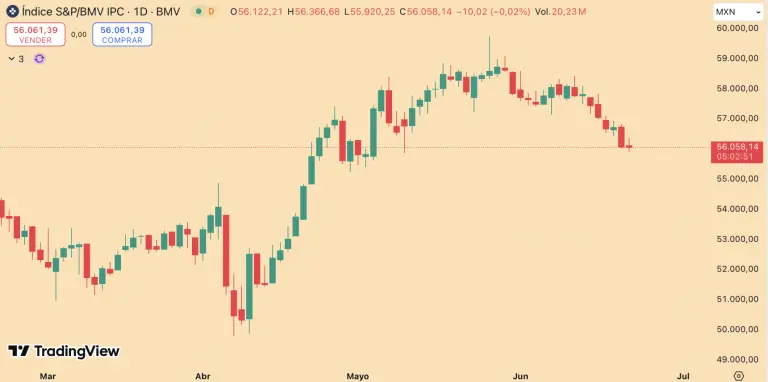Overview of the Mexican Stock Market Performance
On Friday morning, the Mexican stock market experienced a marginal decline. The local bourse indices fell, extending Thursday’s losses and setting the stage for a negative week due to nervousness surrounding the Israel-Iran conflict and the role of the United States.
Key Stock Market Indices
- S&P/BMV IPC: The leading index of the Bolsa Mexicana de Valores (BMV) dropped by 0.05% to 56,041.86 points.
- FTSE BIVA: The index of the Bolsa Institucional de Valores (Biva) decreased by 0.07% to 1,132.41 units.

S&P/BMV IPC
Leading Decliners in the Mexican Stock Market
Within the reference index, most values are operating with losses. GCC led the declines, falling by 1.95% to 176.21 pesos, followed by Industrias Peñoles, down by 1.93% to 481.01 pesos, and Orbia, which decreased by 1.66% to 12.44 pesos.
Anticipated Market Volatility
Analysts and traders predict a volatile day due to the “Witching Day,” referring to the session when major futures and options contracts on stocks and indices expire in the United States, following a day off on Wall Street.
Key Players and Their Relevance
The S&P/BMV IPC is the primary stock market index in Mexico, representing the performance of the most traded local equities. The Bolsa Mexicana de Valores (BMV) is the Mexican stock exchange where these securities are traded. The FTSE BIVA, managed by the Bolsa Institucional de Valores (Biva), is another significant index tracking the Mexican stock market.
GCC, Industrias Peñoles, and Orbia are prominent companies listed on the Mexican stock exchange. GCC is a leading company in the telecommunications sector, while Industrias Peñoles is a major player in the mining industry. Orbia operates in the agribusiness and infrastructure sectors, making it a crucial component of the Mexican economy.
Impact on Investors and the Broader Economy
The marginal decline in the Mexican stock market may cause concern among investors, both local and international. A negative week for the stock market can lead to a loss of investor confidence, potentially affecting future investment decisions. Moreover, the broader economy might experience a ripple effect as reduced stock market performance can influence consumer and business sentiment, potentially impacting spending and investment decisions.
Geopolitical Factors Influencing the Market
The ongoing tensions between Israel and Iran have contributed to the current market nervousness. Geopolitical events can significantly impact financial markets, as investors often react to perceived risks and uncertainties. In this case, the Israel-Iran conflict adds to the existing global market volatility, causing investors to reassess their portfolios and seek safer investment options.
Key Questions and Answers
- What is the main reason for the decline in the Mexican stock market? The primary cause of the marginal decline is nervousness surrounding the Israel-Iran conflict and the role of the United States.
- Which indices experienced declines? The S&P/BMV IPC dropped by 0.05%, and the FTSE BIVA fell by 0.07%.
- Which companies led the declines? GCC, Industrias Peñoles, and Orbia experienced notable losses in their stock prices.
- What is the “Witching Day” and why is it relevant? The “Witching Day” refers to the session when major futures and options contracts on stocks and indices expire in the United States. This event can contribute to market volatility, as seen on Friday.






